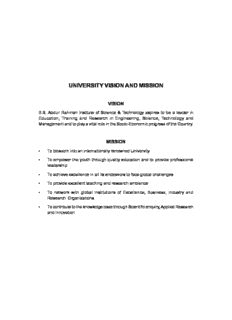Table Of ContentUNIVERSITY VISION AND MISSION
VISION
B.S. Abdur Rahman Institute of Science & Technology aspires to be a leader in
Education, Training and Research in Engineering, Science, Technology and
Management and to play a vital role in the Socio-Economic progress of the Country.
MISSION
• To blossom into an internationally renowned University
• To empower the youth through quality education and to provide professional
leadership
• To achieve excellence in all its endeavors to face global challenges
• To provide excellent teaching and research ambience
• To network with global Institutions of Excellence, Business, Industry and
Research Organizations
• To contribute to the knowledge base through Scientific enquiry, Applied Research
and Innovation
B.Tech.Information Technology
2
VISION AND MISSION OF THE
DEPARTMENT OF INFORMATION TECHNOLOGY
VISION
To be a leader in providing quality education and training in the field of Information
Technology at Undergraduate and Postgraduate levels and undertake Research
activities thereby contributing to the progress of the country.
MISSION
• To impart quality education and inculcate professionalism to suit the needs of
the industries and society.
• To involve graduates in undertaking need based Research activities and
disseminate the knowledge to develop entrepreneur skills.
• To improve the professionalism through extension activities, industrial visits
and in-plant training.
• To communicate effectively both in documentation and presentation.
• To discharge professional, social & economic responsibilities ethically.
B.Tech.Information Technology
4
PROGRAMME EDUCATIONAL OBJECTIVES AND
OUTCOMES
B.Tech. (Information Technology)
PROGRAMME EDUCATIONAL OBJECTIVES
• To provide the necessary fundamental knowledge of mathematics, science
and engineering concepts essential for the information technologists.
• To impart knowledge in the areas of computer architecture, algorithms &
programming, communication & networking, data processing and security
issues.
• To train in the use of tools and techniques for software development in different
application domains and to develop as an entrepreneur.
• To provide necessary soft skills to be an effective information technology
professional.
• To provide opportunities for taking up real life projects.
PROGRAMME OUTCOMES
On completion of the programme the graduate will
• Apply the knowledge of science and mathematics in solving problems related
to information technology.
• Design, develop and test software as per industry requirement.
• Use appropriate tools and techniques learnt for developing software either as a
self sustained entrepreneur or application developer in different domains.
• Use the knowledge and skills acquired to establish a network of systems
ensuring uninterrupted and secure communication.
• Possess necessary soft skills to be an effective professional and practice ethics
in the profession.
B.Tech.Information Technology
6
REGULATIONS 2013
FOR
B.TECH. DEGREE PROGRAMMES
B.Tech.Information Technology
8
REGULATIONS - 2013 FOR
B.TECH. DEGREE PROGRAMMES
1.0 PRELIMINARY DEFINITIONS & NOMENCLATURE
In these Regulations, unless the context otherwise requires:
i) "Programme" means B.Tech. Degree Programme.
ii) "Branch" means specialization or discipline of B.Tech Degree
Programme like Civil Engineering, Mechanical Engineering, etc.,
iii) "Course" means a theory or practical subject that is normally studied in
a semester, like Mathematics, Physics, Engineering Graphics, Computer
Practice, etc.,
iv) "University" means B.S.Abdur Rahman University.
v) "Dean (Academic Affairs)" means the Dean (Academic Affairs) of B.S.
Abdur Rahman University.
vi) "Dean (Student Affairs)" means the Dean (Students Affairs) of B.S.Abdur
Rahman University.
vii) "Controller of Examinations" means the Controller of Examination of
B.S. Abdur Rahman University, who is responsible for conduct of
examinations and declaration of results.
2.0 ADMISSION
2.1a) Candidates for admission to the first semester of the eight semester B.Tech.
degree programme shall be required to have passed the Higher Secondary
Examination of the (10+2) curriculum (Academic stream) prescribed by the
appropriate authority or any other examination of any university or authority
accepted by the University as equivalent thereto.
2.1b)Candidates for admission to the third semester of the eight semester B.Tech.
programme under lateral entry scheme shall be required to have passed the
Diploma examination in Engineering / Technology of the Department of
Technical Education, Government of Tamil Nadu or any other examination of
any other authority accepted by the University as equivalent thereto.
2.2 Notwithstanding the qualifying examination the candidate might have passed,
the candidate shall also write an entrance examination prescribed by the
B.Tech.Information Technology
University for admission. The entrance examination shall test the proficiency
of the candidate in Mathematics, Physics and Chemistry on the standards
prescribed for plus two academic stream.
2.3 The eligibility criteria such as marks, number of attempts and physical fitness
shall be as prescribed by the University from time to time.
3.0 BRANCHES OF STUDY
3.1 Regulations are applicable to the following B.Tech. degree programmes in
various branches of Engineering and Technology, each distributed over eight
semesters with two semesters per academic year.
B.TECH. DEGREE PROGRAMMES:
1. Aeronautical Engineering
2. Automobile Engineering
3. Civil Engineering
4. Computer Science and Engineering
5. Electrical and Electronics Engineering
6. Electronics and Communication Engineering
7. Electronics and Instrumentation Engineering
8. Information Technology
9. Manufacturing Engineering
10. Mechanical Engineering
11. Polymer Engineering
4.0 STRUCTURE OF THE PROGRAMME
4.1 Every Programme will have a curriculum with syllabi consisting of theory and
practical courses such as,
i) Basic Sciences (BS)
ii) Humanities & Social Sciences (HS)
iii) Management Sciences (MS)
iv) Engineering Sciences Fundamentals (ESF)
v) Engineering Core Courses (EC)
vi) Professional Electives (PE)
10
Description:REFERENCES: 1. Limaye L G, "Software Testing - Principles, Techniques and Tools", Tata Mc-. Graw Hill Education Pvt. Ltd., New Delhi, 2009. 2. Aditya P.Mathur, "Foundations of Software Testing", Pearson Education, 2008. 3. Boris Beizer, "Software Testing Techniques", 2nd Edition, Dreamtech, 2003.

